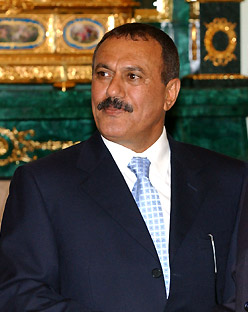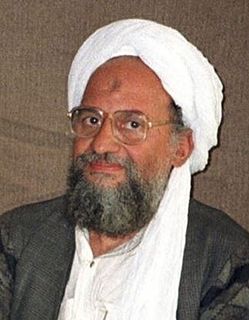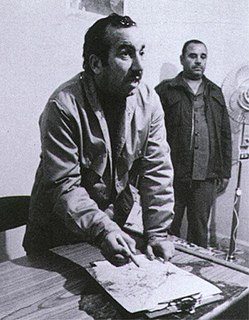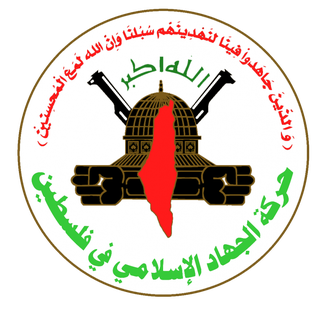
Muhammad Anwar el-Sadat was the third President of Egypt, serving from 15 October 1970 until his assassination by fundamentalist army officers on 6 October 1981. Sadat was a senior member of the Free Officers who overthrew King Farouk in the Egyptian Revolution of 1952, and a close confidant of President Gamal Abdel Nasser, under whom he served as Vice President twice and whom he succeeded as President in 1970.

Sheikh Omar Abdel-Rahman, commonly known in the United States as "The Blind Sheikh", was a blind Egyptian Muslim leader who served a life sentence at the Federal Medical Center, Butner in Butner, North Carolina, United States. Formerly a resident of New York City, Abdel-Rahman and nine others were convicted of seditious conspiracy. His prosecution grew out of investigations of the 1993 World Trade Center bombing.

Ali Abdullah Saleh was a Yemeni politician who served as President of the Yemen Arab Republic from July 1978, after the assassination of President Ahmad al-Ghashmi, to 22 May 1990, when he became the first President of Yemen following Yemeni unification. He led the country until his resignation on 25 February 2012 following the Yemeni Revolution.

Ayman Mohammed Rabie al-Zawahiri is the current leader of al-Qaeda and a current or former member and senior official of Islamist organizations which have orchestrated and carried out attacks in North America, Asia, Africa, and the Middle East. In 2012, he called on Muslims to kidnap Western tourists in Muslim countries.

Yemen , officially known as the Republic of Yemen, is a country at the southern end of the Arabian Peninsula in Western Asia. Yemen is the second-largest Arab sovereign state in the peninsula, occupying 527,970 square kilometres. The coastline stretches for about 2,000 kilometres. It is bordered by Saudi Arabia to the north, the Red Sea to the west, the Gulf of Aden and Guardafui Channel to the south, and the Arabian Sea and Oman to the east. Yemen's territory includes more than 200 islands.

Khalil Ibrahim al-Wazir was a Palestinian leader and co-founder of the nationalist party Fatah. As a top aide of Palestine Liberation Organization (PLO) Chairman Yasser Arafat, al-Wazir had considerable influence in Fatah's military activities, eventually becoming the commander of Fatah's armed wing al-Assifa.
This is a timeline of major events in the Muslim world from 601 AD to 700 AD.

Anwar al-Awlaki was a Yemeni-American preacher and imam. U.S. government officials allege that, as well as being a senior recruiter and motivator, he was centrally involved in planning terrorist operations for the Islamist militant group al-Qaeda, but have not pointed to evidence to support this claim. Al-Awlaki became the first U.S. citizen to be targeted and killed by a U.S. drone strike without the rights of due process being afforded. President Barack Obama ordered the strike. His son, Abdulrahman al-Awlaki, was killed in a U.S. drone strike ordered by Barack Obama two weeks later. On January 29, 2017, al-Awlaki's 8-year-old daughter, Nawar Al-Awlaki, was killed in a U.S. commando attack in Yemen that was ordered by President Donald Trump. With a blog, a Facebook page, the al-Qaeda magazine Inspire, and many YouTube videos, al-Awlaki was described by Saudi news station Al Arabiya as the "bin Laden of the Internet". After a request from the U.S. Congress, in November 2010, Google removed many of al-Awlaki's videos from its websites. According to The New York Times, al-Awlaki's public statements and videos have been more influential in inspiring acts of terrorism in the wake of his assassination than before his death.
The State Security Investigations Service was the highest national internal security authority in Egypt. Estimated to employ 100,000 personnel, the SSI was the main security and intelligence apparatus of Egypt's Ministry of Interior. The SSI focused on monitoring underground networks of radical Islamists and probably planted agents in those organizations and had the role of controlling opposition groups, both armed groups and those engaged in peaceful opposition to the government. It has been described as "detested" and "widely hated".
Targets of terrorism in Egypt have included government officials, police, tourists and the Christian minority. Many attacks have been linked to Islamic extremism, and terrorism increased in the 1990s when the Islamist movement al-Gama'a al-Islamiyya targeted high-level political leaders and killed hundreds in its pursuit of implementing traditional Sharia law in Egypt.
The case of the Returnees from Albania was a massive criminal trial in an Egyptian military court from February to April 1999. The trial is one of the principal sources of information about Sunni terrorist groups in the 1990s, especially al-Gama'a al-Islamiyya and its offshoot Egyptian Islamic Jihad.

The Islamic Jihad Movement in Palestine known in the West as simply Palestinian Islamic Jihad (PIJ), is a Palestinian Islamist terrorist organization formed in 1981 whose objective is the destruction of the State of Israel and the establishment of a sovereign, Islamic Palestinian state. PIJ has been labelled a terrorist organisation by the United States, the European Union, the United Kingdom, Japan, Canada, Australia, New Zealand and Israel. Iran is a major financial supporter of the PIJ. Following the Israeli and Egyptian squeeze on Hamas in early 2014, PIJ has seen its power steadily increase with the backing of funds from Iran. Its financial backing is believed to also come from Syria. The Islamic Jihad Movement has sent "its gratitude to the brothers in Hezbollah, the Islamic resistance in South Lebanon. Particularly Hassan Nasrallah, for their stance and support, be it financial, military or moral support".
The Vanguards of Conquest is a terrorist organization that was originally founded in 1993 as a branch of the Egyptian Islamic Jihad operating in Somalia, but became a separate faction that eventually folded back into the group under the leadership of Ayman al-Zawahiri. The revived group is currently led by Magdy Salem. The group has intervened to stop jihadis in the Sinai Peninsula from attacking Israel.
Yasser Tawfiq Ali El-Sirri is an Egyptian militant connected to the Vanguards of Conquest and al-Jama'a al-Islamiyya, sentenced to death in the 1998 Returnees from Albania trial.

The Yemeni Congregation for Reform, frequently called al-Islah, is a Yemeni Islamist party founded in 1990 by Abdullah ibn Husayn al-Ahmar, Ali Mohsen al-Ahmar, Abdul Majeed al-Zindani, Mohammed al-Yadumi and Yahya Rassam. The first article of Islah basic law defines it as "a popular political organization that seeks reform of all aspects of life on the basis of Islamic principles and teachings".
The assassination of Anwar Sadat occurred on 6 October 1981. Anwar Sadat, the President of Egypt, was assassinated during the annual victory parade held in Cairo to celebrate Operation Badr, during which the Egyptian Army had crossed the Suez Canal and taken back a small part of the Sinai Peninsula from Israel at the beginning of the Yom Kippur War. A fatwa approving the assassination had been obtained from Omar Abdel-Rahman, a cleric later convicted in the US for his role in the 1993 World Trade Center bombing. The assassination was undertaken by members of the Egyptian Islamic Jihad.
Abdul Halim Moussa was an Egyptian police major general and interior minister who was in office from 1990 to 1993.
Hassan Al Alfi was a police major, governor and interior minister of Egypt. He served as interior minister from 1993 to 1997. He resigned from office following the Luxor massacre.
The Egyptian Islamic Jihad, formerly called simply Islamic Jihad, originally referred to as al-Jihad, and then the Jihad Group, or the Jihad Organization, is an Egyptian Islamist terrorist group active since the late 1970s. It is under worldwide embargo by the United Nations as an affiliate of Al-Qaeda. It is also banned by several individual governments worldwide. The group is a Proscribed Organisation in the United Kingdom under the Terrorism Act 2000.









